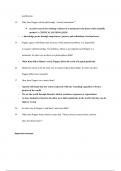justification.
14. Why does Popper call his philosophy “critical rationalism”?
● an active search for refuting evidence of a statement is the heart of the scientific
method -> CRITICAL RATIONALISM
- = knowledge grows through conjectures= guesses, and refutations, trial and error
15. Popper agrees with Hume that, because of the induction problem, it is impossible
to acquire valid knowledge. Nevertheless, Hume is an empiricist and Popper is a
rationalist. In what way do these two philosophers differ?
- What Ksnt did to Hume’s work, Popper did to the work of Logical positivists
16. Deduction seems to be the only way to acquire logical knowledge. In what way does
Popper differ from Aristotle?
17. How does Popper view innate ideas?
- Agreed with Kant that our senses cooperate with our reasoning capacities to form a
picture of the world
- We see the world through theories; inborn reactions, responses or expectations
- we have instinctive theories tha allow us to find regularities in the world; but they can be
right or wrong
18. In what way do Popper’s and Kant’s nativism differ?
19. What does Popper mean when he states that ‘Theory always comes before, and not
after, the observation’?
Important concepts
, Confirmative
Corroboration
Negative road to truth
Informativity
Critical test
Critical rationalism
2. Describe and explain Popper’s tetradic schema of knowledge development.
3. Which three worlds does Popper distinguish in this text? Name and describe them.
World 1 : The physical world
- physical objects and events, matter and energy
World 2 : The mental/psychological world
- conscious intelligent minds with intentionality and mental states
World 3 : The products of the human mind; the abstract world
- Unembodied objects such as abstract entities , language, mathematics
- Embodied entities; products of human design and engineering
4. What is characteristic about world 3 objects compared to world 2 mental processes?
- Objective knowledge can be found and is stored in World 3
- World 3 theories have a casual effect on world 1 through 2 (intermediary role)
- scientific knowledge is no longer part of ourselves but objectified in world 3
- exposed to objective criticism
- knowledge grows through interaction and critical selection
! GENERAL!
- Different positions about the reality of the world
1. Materialist monist or physicalist= only accept world 1 (most philosophers)
, 2. Dualist= accept world 1 and world 2 (common sense)
3. Pluralist= accept world 1, 2 and 3 (Popper)
5. What is meant by a world 3 object that transcends both the physical and cognitive
worlds?
6. Are world 3 objects always true? Why or why not?
7. When will world 3 objects be true in Popper’s epistemology do you think?
- Objective knowledge = abstract content of books, theories etc. (world 3) through
contents
● Subjective knowledge = personal knowledge = in the minds of people (world2),
thought processes
- Objective knowledge is in the objective mind (in World 3)
! Formulated in language they can be object of criticism and after a crucial test to falsify the
statement, they can become collective truth/corroborated statements/theories !
Important concepts
Popper’s tetradic schema
Abstract objects
Concrete objects
WEEK4
P295-331
1. What are the four main problems with Popper’s version of falsificationism? (This
question belongs to chapter 7, par. 7.8, pp. 283-287)
- Logical positvists wanted no more metaphysics/ideology in science and a solid
foundation for proven knowledge through verification
- Popper said no to verification due to fallibillity, we should use falsification
PROBLEMS:
1. One false hypothesis does not lead to the rejection of theories
2. Pseudosciences (like astrology) also make falsifiable claims, so falsification as
demarcation is not strong enough






